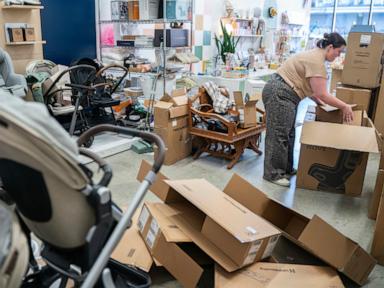Now Reading: Strollers, other baby products will get more expensive, harder to find with tariffs
-
01
Strollers, other baby products will get more expensive, harder to find with tariffs
Strollers, other baby products will get more expensive, harder to find with tariffs

Sam Rutledge and his wife, expecting a baby in mid-July, initially planned to take their time researching and purchasing necessary baby gear. However, President Donald Trump’s tariff announcement in early April accelerated their shopping process. Over the past few weeks, they have acquired various items such as strollers, a car seat, a nursery glider, a crib, and a high chair, all of which were manufactured overseas.
Rutledge, a high school physics teacher, noted that these purchases are already costly, but the looming threat of tariffs prompted them to buy sooner to avoid potential price hikes. The expenses of raising a child in the U.S. are already high, averaging around $20,384 in the first year, according to Baby Center. With tariffs set to increase costs significantly, new parents are facing even greater financial burdens.
The Juvenile Products Manufacturers Association revealed that approximately 90% of essential baby care products and components used in manufacturing baby items, such as bottles, strollers, and car seats, are sourced from Asia, particularly China. This reliance on overseas production has been a longstanding practice in the industry.
Despite efforts to diversify their manufacturing sources, many companies struggle to find suitable alternatives to China due to the lack of skilled labor and specialized equipment in the U.S. Munchkin Inc., for instance, is experiencing disruptions in its supply chain and is unable to absorb the additional costs from tariffs.
While some baby products have been exempted from import taxes in the past, the uncertainty surrounding future tariff exemptions under the Trump administration is causing concern among manufacturers and retailers. Companies like Nurture& and small businesses like Three Littles and The Little Seedling are feeling the impact of potential price increases and are uncertain about how they will navigate these challenges in the coming months.
As the baby industry grapples with the implications of tariffs, the focus remains on ensuring that essential baby products remain accessible and affordable for families in the U.S.






